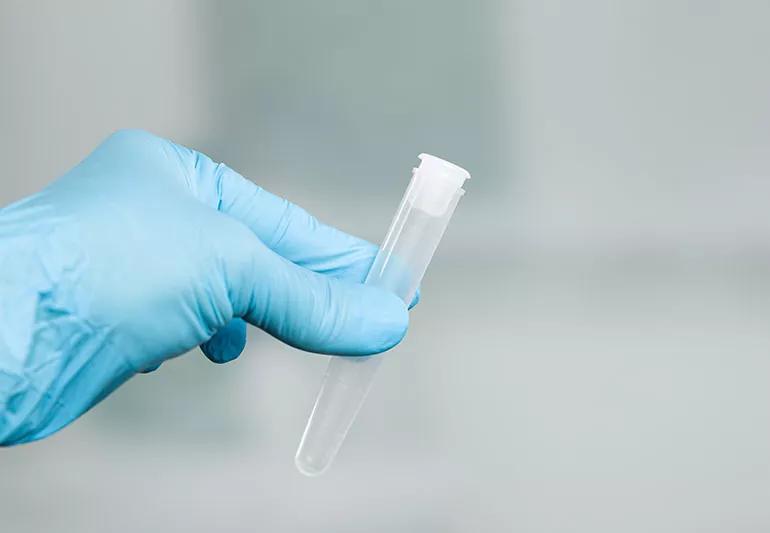This safe, low-risk procedure can restore your fertility in as little as three weeks

Image content: This image is available to view online.
View image online (https://assets.clevelandclinic.org/transform/910d6dc6-7b36-4559-8c93-870a4db2f3ea/Reverse-Vasectomy-1166567453-770x533-1_jpg)
Gloved hand holding a medical vial.
When you choose to have a vasectomy, it’s considered permanent sterilization. But some people do consider vasectomy reversal down the line.
Advertisement
Cleveland Clinic is a non-profit academic medical center. Advertising on our site helps support our mission. We do not endorse non-Cleveland Clinic products or services. Policy
In fact, 6% to 10% of people who’ve had a vasectomy change their minds and undergo a reversal. Life circumstances often spur the decision, like maybe a new marriage, a couple deciding they want children (or more children) or the death of a child.
“Because vasectomies are considered permanent sterilization, a lot of people don’t realize that reversing it ― for whatever reason life throws their way ― is actually doable,” says urologist Sarah Vij, MD, Director of the Center for Male Fertility.
Here’s what you need to know about vasectomy reversal, an increasingly common surgical procedure.
In a vasectomy, a surgeon clamps or reroutes the vas deferens, the internal tubing that carries sperm from your testicles and out of your penis. A vasectomy reversal is a minimally invasive procedure that, well, reverses your vasectomy.
It’s a very safe procedure, with a less than 1% risk of bleeding and infection. Surgeons use microsurgery techniques to put your tubing back together; their surgical microscopes can magnify up to 25 times! And the six to eight stitches you’ll receive when it’s over are finer than a human hair.
“Surgery takes about two hours,” Dr. Vij says, “and you’re able to go home that day.” You can go back to work in a day or two, if you have a desk job, or in three to four days if you have a more strenuous job.
Advertisement
If you’re thinking about undergoing a vasectomy reversal, you’ll likely need to pay out of pocket. Because the procedure is considered elective, it’s usually not covered by health insurance.
“This comes as a surprise to many patients,” Dr. Vij says, “but after a vasectomy, your testicles continue to produce sperm — it just doesn’t have any way to leave your body.”
That means that when you get a vasectomy reversal, your normal fertility is restored. After the procedure, you’ll have to abstain from sex for about three weeks until you’ve fully healed, but then you can start trying to conceive.
But if you’re found to have a blockage in your epididymis (the coiled tube along the testicle where sperm matures), it can take as long as 12 months for your fertility to return.
It’s a common misconception that if you had a vasectomy years ago, your reversal won’t succeed at all. “That’s generally not true,” Dr. Vij says. “Success rates depend primarily on the time since vasectomy.”
Vasectomy reversal success rates can be as high as 95% if the vasectomy was done within the last 10 years, though this rate starts to decline at 15 years.
And time isn’t the only consideration. Even after you’ve had a successful reversal, several other factors contribute to whether or not your partner will become pregnant. The health of your sperm is a key factor, as is your partner’s age.
Your partner’s health and fertility must be taken into consideration, Dr. Vij says, so if you’re considering a vasectomy reversal, both of you should be examined beforehand to identify any fertility issues and discuss your options.
“In some couples, we opt to do a sperm retrieval procedure to enable in vitro fertilization,” she says. Especially when time is a factor, these methods are a more efficient way to achieve pregnancy than natural methods.
Your doctor can walk you through all of your options to determine what’s best for you and your family.
Advertisement

Sign up for our Health Essentials emails for expert guidance on nutrition, fitness, sleep, skin care and more.
Learn more about our editorial process.
Advertisement
Specific foods won’t really affect fertility, but a healthy weight and nutritious diet are helpful
This simple, permanent procedure may be the way to go
Getting vaccinated won’t impact your fertility, but getting the virus could
The short answer from an infertility specialist
These over-the-counter kits can help you identify when you’re most fertile.
It’s great for stress relief, which can go a long way when you’re trying to conceive
Low T can decrease fertility, but there is hope
New consumer-friendly devices have limitations for assessing male fertility
Type 2 diabetes isn’t inevitable with these dietary changes
Applying a hot or cold compress can help with pain
Pump up your iron intake with foods like tuna, tofu and turkey